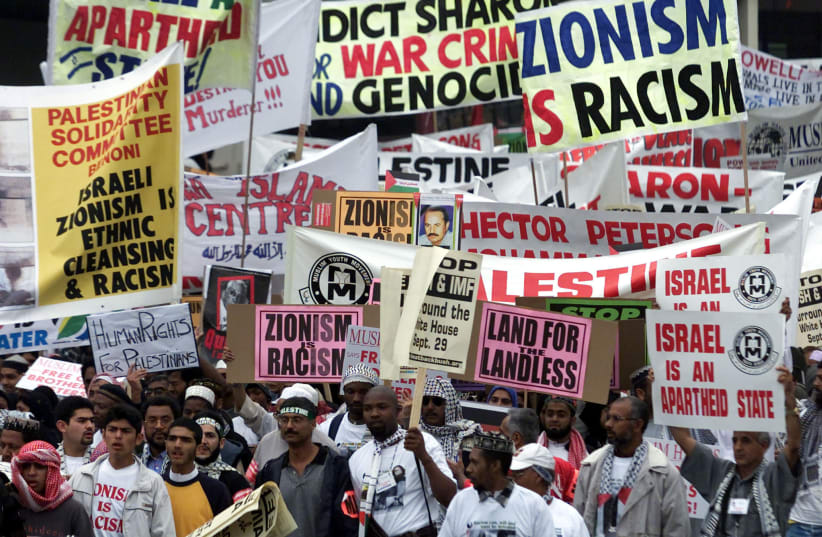Berlin will not attend the UN event marking the 20th anniversary of the World Conference Against Racism in Durban, South Africa, a German diplomatic source confirmed on Sunday.
France has yet to announce its position on the conference, which it has boycotted in the past, raising questions from activists against antisemitism.
Germany will be the 10th country to boycott the September event, also known as Durban IV. In the 2001 event and its subsequent review conferences, Israel was singled out for opprobrium, antisemitic materials were disseminated and participants engaged in Holocaust denial.
As of early July, the UN General Assembly’s working draft for a resolution to be adopted at Durban IV said that they “reaffirm the Durban Declaration and Programme of Action, adopted in 2001... and reaffirm our commitment to its full and effective implementation.” This implies that the September conference will single out the Jewish state, as the 2001 resolution did.
Israel was the only country specifically mentioned as racist in the statement made by UN member states participating in the conference. The US and Israel walked out early from the events.
Antisemitism was rife at the 2001 Durban Conference’s NGO forum, where copies of the anti-Jewish conspiracy theory The Protocols of the Learned Elders of Zion were distributed, Israel was accused of genocide and participants distributed fliers considering whether Hitler was right.
Iran’s then-president Mahmoud Ahmadinejad called the Holocaust an “ambiguous and dubious question” at Durban II in 2009 and a “pretext” for oppressing Palestinians, and was invited back to speak at Durban III.
A German diplomatic source confirmed a report in Welt Am Sonntag that the German Foreign Ministry said it would not participate, but did not give a reason.
On Friday, German Foreign Minister Heiko Maas spoke to his Israeli counterpart, Yair Lapid, with the ministry tweeting that their main topics of discussion were the “situation in the Eastern Mediterranean and perspectives for the Middle East Peace Process.”
Other countries that announced in recent months they would not attend are Israel, US, Canada, Australia, UK, Hungary, Austria, Netherlands and the Czech Republic. This falls short of the 15 that skipped the Durban III conference in 2011: Bulgaria, France, Italy, New Zealand and Poland also took part in that boycott.
Jewish organizations have begun to question why France is taking so long to announce its position on the Durban Conference. Though a diplomatic source told The Jerusalem Post months ago that France would not attend, Paris has not made any public statement.
Earlier this month, Francis Kalifat, head of the French Jewish umbrella organization CRIF, called for the French government to boycott Durban IV at a memorial for the 1942 Vel d’Hiv roundup of Jews to be sent to Nazi concentration camps.
Kalifat pointed to a “particularly pernicious approach” to antisemitism that compares Israel to Nazi Germany.
“The perversity of this equation is not only in the obsessive demonization of Israel: It lies in the fact that by this equivalence, it in a way absolves the Nazis,” Kalifat stated. “The Durban Conference in 2001 was the most glaring example of this antisemitic delirium.”
The CRIF leader made a “solemn appeal” to France’s leaders to pull out of Durban IV, “so that France does not lose its soul... by participating in this masquerade. Other democratic countries, natural allies of France in the fight for human rights... have announced they will not participate in this campaign, which is the peak of shamefulness. I hope from the bottom of my soul that my country does not go astray.”
Anne Bayevsky, one of the original Durban Conference’s most prominent critics and head of the Touro College Institute on Human Rights and the Holocaust, called it “shocking” that France is “still in the backrooms of the UN planning a 20th-anniversary celebration of an antisemitic hate-fest.
“We need to be very clear about what these countries are now doing... France [is] participating in the production of the ‘political declaration’ to be adopted at Durban IV - knowing full well that it is intended to spread the Durban Declaration’s lie, emblematic of modern antisemitism, that the Jewish state is a racist state,” Bayefsky said.
“[France] refused to attend the 10th anniversary, voted against holding the 20th, and claims to care about rising antisemitism in their midst,” she said. “So the bottom line is that they’ve run out of excuses to do anything but immediately withdraw from Durban IV.”
Touro College Institute on Human Rights and the Holocaust and the pro-Israel organization CAMERA plan to host a counter-conference in New York a day before Durban IV, with Ambassador to the US and UN Gilad Erdan in attendance.
UN Watch released a report earlier this month criticizing the world body for its role in increasing antisemitism around the world, drawing a line between today’s rise in hatred of Jews and the 2001 Durban conference, which it described as “hijacked by pro-Palestinian activists who turned the event into the worst international manifestation of antisemitism in the post-war period.”
“The United Nations has played a key role in the spread of global antisemitism,” UN Watch executive director Hillel Neuer said. “Those countries boycotting Durban recognize this and should be commended for not commemorating a festival of Jew-hate.”
